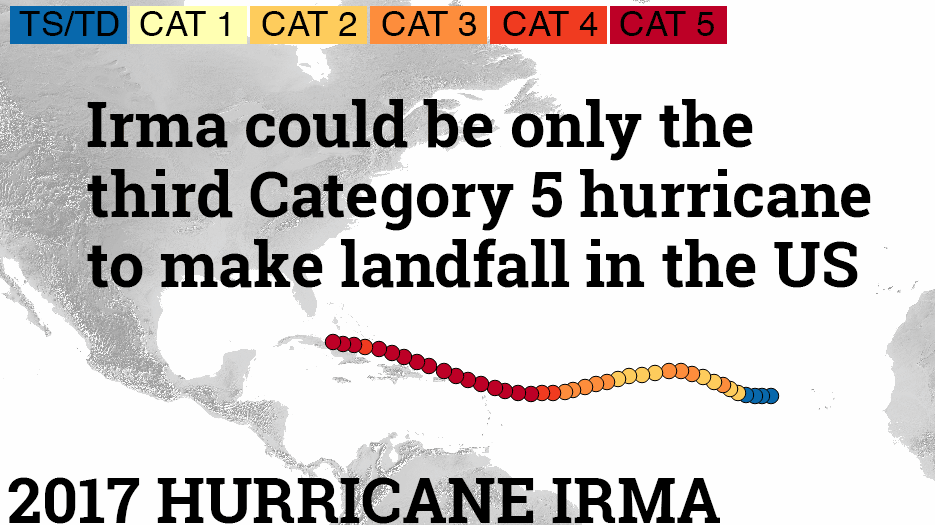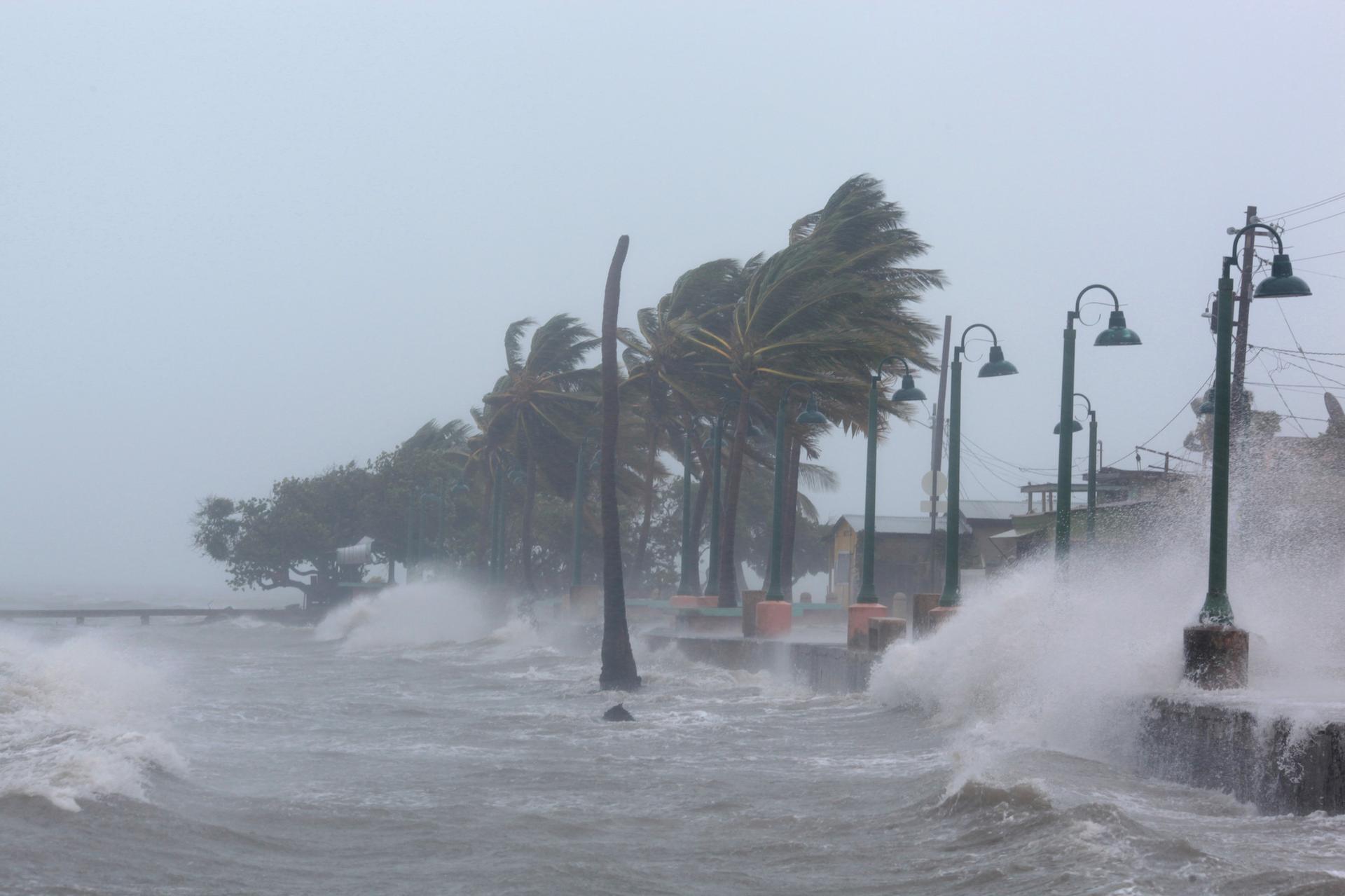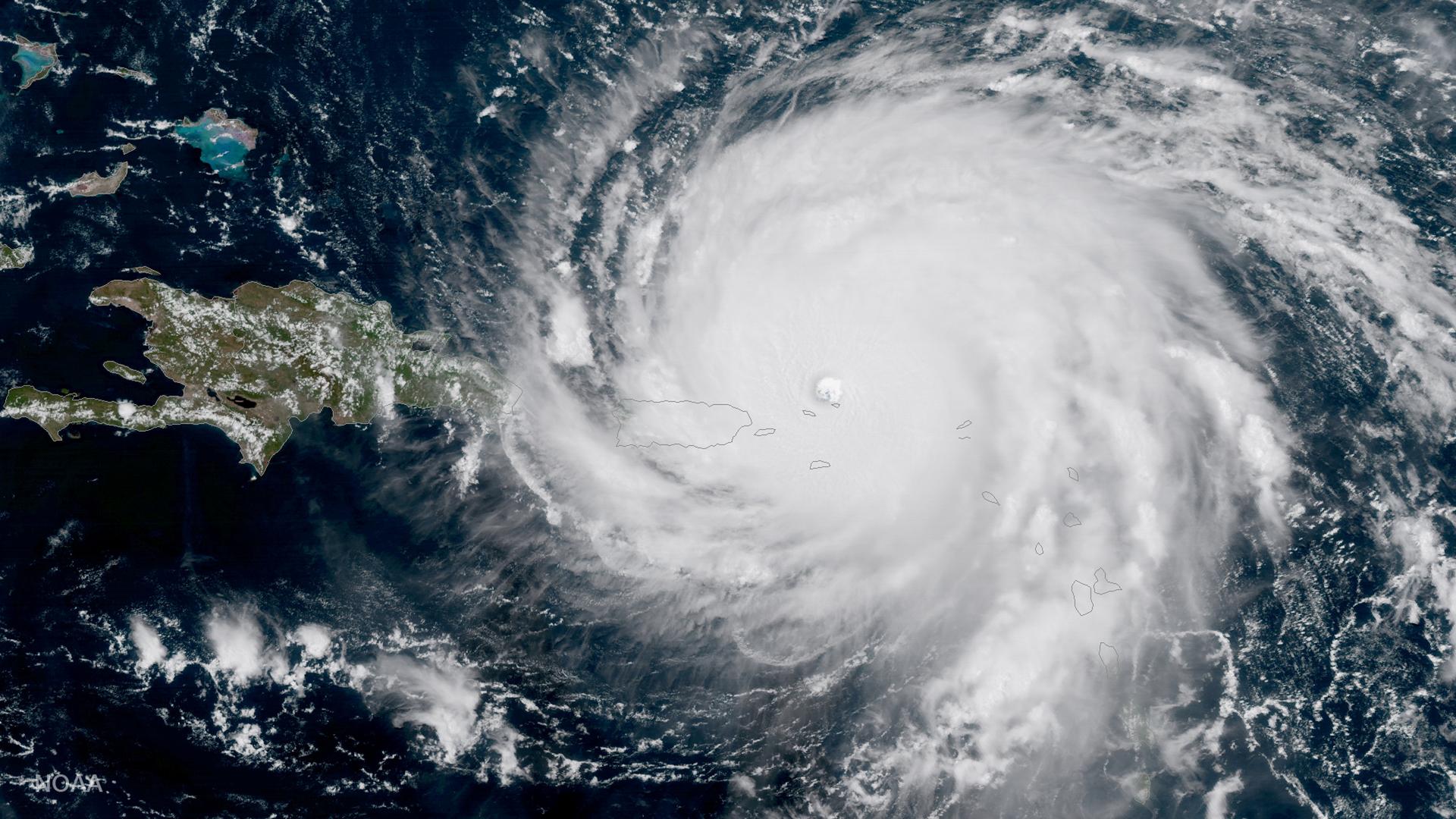After Hurricane Irma, Puerto Ricans and Virgin Islanders want more relief from fellow Americans
Hurricane Irma, a record Category 5 storm, is seen approaching Puerto Rico in this satellite image taken at about on September 6.
Puerto Ricans and residents of the US Virgin Islands are struggling to pick up the pieces following Hurricane Irma’s pummeling of the Caribbean — and Hurricane Jose is knocking on their door.
After wreaking havoc in the Leeward Islands, the hurricane scooted just north of Puerto Rico, sparing it the most catastrophic damage. While St. Croix, one of three islands that make up the US Virgin Islands, experienced only minor damage, the storm hit sister islands St. John and St. Thomas head on, destroying nearly everything in its wake.
As of Sunday, officials said 27 people died from Irma-related incidents in the Caribbean region, including three deaths reported in the US islands of St. Thomas and St. John.
While the cleanup effort begins, many residents of these US territories say the challenges of storm relief they face are not just the devastation, but also neglect from the continental US.
“We’re always feeling like second-class citizens. They just skip over us and it hurts,” says Stephanie Brown, a local reporter on the island of St. Croix. Between press conferences and reporting, she’s fielding messages from frantic Virgin Islanders in the continental US and abroad, desperately seeking updates from the ground or word about a missing relative.

Data is from NOAA's database of billion-dollar climate and weather disasters.
“Social media has been the basis for much of everyone’s information gathering,” she adds.
Puerto Ricans and US Virgin Islanders are American citizens by birth, pay taxes and are overrepresented in the military. Still, coverage of these territories is often reduced to natural disasters like Irma, Carnival in St. Thomas and Puerto Rico’s financial crisis. Even during hurricanes, the plight of these islands is often overshadowed by events in Florida, Cuba, Haiti or the Dominican Republic.
Telecommunications remain down on St. John and St. Thomas, and power could be out for months in parts of Puerto Rico.
Stephanie Latona lives in Vieques, Puerto Rico, one of the smaller islands off the cost of Puerto Rico's main island, which suffered substantial rain and wind damage. She says if it weren’t for her cellphone and platforms like Facebook and WhatsApp, she’d have a hard time letting her peers know she’s even alive. Ahead of the storm, she said national media coverage was almost nonexistent.
“Everywhere was Florida this, Florida that. Even Georgia and the Carolinas too,” she says. “Yes, Irma will be serious for the southeast, but when Florida can get round-the-clock attention about a storm that hasn’t even hit yet, while [Puerto Ricans] can barely get a mention or an update as it’s happening, that’s a problem.”

Power and electricity in Vieques are expected to be down for days, possibly weeks. Shortages of gas and food also mean residents are banding together to support each other in areas the local government is not reaching them.
"They're telling us nothing," Latona says of Puerto Rican officials. "The most information we're getting is a woman riding her car around with giant speakers blasting the radio or a neighbor on a microphone giving updates. That's pretty much it: band together or fend for yourselves because the government is telling us nothing."
Latona says she’s not surprised by the limited focus on Puerto Rico. “People only pay attention to us during presidential primaries, when Congress meddles with our budget and statehood votes.” She says many Puerto Ricans feel ignored by the federal government and by Americans in the states.
“If no one is paying attention when our schools are crumbling and our economy is failing, there’s nothing that makes me think they’ll care when our buildings are toppling and roads flooding,” she says.
For the US Virgin Islands, getting updates can be even worse. Concerned family members are finding little help or information. The situation in St. John is the most bleak, with phone and power lines still down and little communication. Family members have resorted to calling a St. Croix-based radio station that broadcasts in both the US and British Virgin Islands. Callers leave messages for loved ones who may be listening. Residents of St. Thomas are now being asked to call a reunification number operated by the American Red Cross.
According to Brown, the reporter in St. Croix, many residents felt like pre-storm updates still left Virgin Islanders with little information about Irma’s trajectory.
“You have people trying to figure out the coordinates relative to Puerto Rico or Florida to guess exactly when Irma would hit us," she says. “Once the storm hit and knocked out power, we couldn’t get updates at all here and our friends and families elsewhere had no information to give because where were they going to get it?”
The lack of media attention also frustrated Virgin Islanders in the continental US. Audrey Malone, a St. Thomas native now living in Long Island, New York, says turning on her TV and seeing no mention of her homeland left her “pissed.”
“There was no coverage in the days leading up to the hit and nothing during,” she says. “But social media, some angry Virgin Islanders stateside and a massive effort, helped to change that conversation.”
“It's not grand, but the conversation is no longer just about Florida,” she adds.
While Brown and Malone highlight the frustrations, they both acknowledge government officials, including Virgin Islands Governor Kenneth Mapp and Stacey Plaskett, the territory's nonvoting member of the US House of Representatives, have been hands-on. The government is using its social platforms to share rescue and recovery efforts.
Over the weekend, President Donald Trump ordered more federal funding for relief efforts in Puerto Rico and the US Virgin Islands. Yet the media coverage of other hurricane relief in Texas and Florida, and the unexpected political moves involved, have dominated the news.
Malone also credits national media outlets for eventually taking notice, including airing a White House press conference on Puerto Rico's and the Virgin Islands’ statuses. However, she says Virgin Islanders need much more.
“The road ahead is tough and we as US citizens are going to need the entire US hearing our story and helping us rebuild,” Malone says.
Back in Puerto Rico, Latona echoes the same need for acknowledgement as the Caribbean recovers from Irma while bracing for Jose.
“People need to remember that we’re Americans too,” Latona says. “We deserve the same response and relief efforts as people in Texas right now, or people in Florida soon. We need you.”
Calls and emails for comment from the US Department of Homeland Security and FEMA’s Caribbean office were not returned.
Correction: The name of Vieques resident Stephanie Latona was misspelled in a previous version of this story.
Our coverage reaches millions each week, but only a small fraction of listeners contribute to sustain our program. We still need 224 more people to donate $100 or $10/monthly to unlock our $67,000 match. Will you help us get there today?
